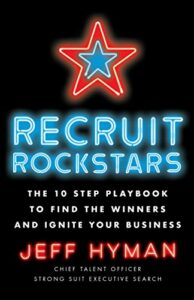When it comes to interviews, remember two key things:
- A résumé is nothing more than a sales brochure. Use it to decide who you might want to interview — after that, its value is minimal.
- Executed poorly, interviews are a lousy tool for predicting who will succeed at your company.
A client of mine, the CEO of a professional services company, was struggling to hire talented people. Like most executives, her success rate was about 50/50. It seemed like a weekly task of firing the mis-hires, which was not only a disruption to business but also emotionally exhausting.
I asked her if I could sit in on a few of her interviews. She hesitated, insistent that she had interviewed countless candidates over the years. I promised not to say a word, just to observe.
She obliged. I sat in on a handful of her interviews, only to discover that her interviews were unstructured, almost haphazard. She was ill-prepared, random in her approach, talking far too much, making up questions on the fly.
She was making almost every interviewing mistake in the book.
Interviews must be structured and consistent from one candidate to another. Together, we created a clear sequence of standardized predictive questions, and a year later, 75 percent of her hires are keepers.
In other words, she improved her success rate by 50 percent.
Interviewing is where recruiting falls apart for most people. Too many hiring managers rely only on interviews and, frankly, those interviews stink.
Don’t believe me? You’ve been a candidate during your career — on the other side of the table. How many times can you remember being impressed by the discipline and forethought of the interviewer grilling you? Not often, I’ll bet.
Non-predictive traits
Years ago, recruiting and interviewing were black magic. The science just didn’t exist. But fast-forward to today; there are countless studies that have correlated hiring factors to candidate success. We can actually look at what is predictive and what’s not.
So, why would we possibly use the latter? Simple. You’ve been too busy to find out. I’ve dug up and examined every study that’s been done.
Turns out, executives tend to focus on many characteristics that have little to no ability to forecast the success of a candidate. So, what are those traits? Some will surprise you.
Industry experience
 Experience within an industry is, of course, nice to have but isn’t sufficient by itself to predict a candidate’s success. I’ll take the right DNA any day of the week and teach the new hire my industry.
Experience within an industry is, of course, nice to have but isn’t sufficient by itself to predict a candidate’s success. I’ll take the right DNA any day of the week and teach the new hire my industry.
It also turns out that candidates from the industry — even from a direct competitor — often bring bad habits with them, and poor assumptions about the industry. They just have a different world view.
The fresh perspective of an outsider — of course, with the right competencies and DNA — is a better bet in almost every case. Not to mention, there are no hassles with non-compete agreements. Don’t make the mistake of assuming that because a candidate worked in your industry that they will succeed at your company.
Education
Nor does it matter where someone went to school or what their GPA was. Just because someone was a good test-taker doesn’t mean they’re going to be a Rockstar.
Intelligence and book smarts are useful, but cognitive ability — the ability to learn, make decisions, and adjust one’s approach based on new information — is far more valuable. After going back to study the correlation, even Google no longer sets a minimum GPA for all employees, a practice it once swore by.
Brainteasers
If you’re still asking brainteaser questions, stop. Things like, “Why is a manhole cover round?” or “How many birdcages are there in New York City?” will not help you figure out who to hire.
Google was famous for these questions early on; they’ve banned them, too.
Gut feelings
Meeting a candidate for lunch and asking, “So tell me about yourself,” will not reveal whether they are a Rockstar.
You may leave the interview with a comforting gut feel, but the gut misleads.
Predictors of success
Now you know some of the traits that are not predictive of success. So, let’s look at those that are.
Test drive
According to a 1998 study by Schmidt and Hunter, the single best predictor of success is the Test Drive. It needs to be a mandatory part of your hiring process.
 We’ll delve into the Test Drive later, but, in the meantime, think of it as a dry run with the candidate to see how they perform in the real world. They take a bit of time, so you won’t be able to put all candidates through one. So, I use the interview process to determine whom I’d like to invest that time with.
We’ll delve into the Test Drive later, but, in the meantime, think of it as a dry run with the candidate to see how they perform in the real world. They take a bit of time, so you won’t be able to put all candidates through one. So, I use the interview process to determine whom I’d like to invest that time with.
Structured interviews
If you ask the same questions in the same order to each candidate, you’ll be able do two things:
- Follow the trend line of a candidate in his or her career; and,
- Assess the candidates against each other.
The key is to be methodical and consistent. This can be boring and monotonous for the interviewer, but it’s not about keeping yourself entertained; it’s about hiring the best person. When I observed my client’s questions with candidates, they were random. She hopped around from job to job; there was no structure.
This made it impossible to tell if the candidate’s growth and track record was accelerating, decelerating, or stuck. In addition, she couldn’t compare and contrast across candidates because she asked different questions of each one.
I confess. I sometimes bore myself to tears during interviews, asking the same carefully worded questions over and over and over. But by doing so, I can assess a candidate’s trendline (I think of it as analogous to a stock chart). I can compare him to other candidates. And over time, I develop a better base of interviewing knowledge because I’m asking the same questions of everyone.
Cognitive ability
This is so much more valuable than raw intellect or IQ.
- Can the candidate ask questions, consume information, and adjust their approach accordingly?
- Are they open-minded enough to take information that conflicts with their pre-existing mindset?
- Can they separate the signal from the noise?
These characteristics aren’t easy to assess, but they’re vital in today’s ever-changing business environment.
A head of marketing, for example, can’t know every single thing about every single marketing tactic. But if she has a high cognitive ability, she will know what questions to ask, where to get the answers, how to understand the data, and adapt her approach.
DNA
We devoted an entire chapter to DNA earlier because without a DNA match, the individual will be unable to succeed within your enterprise.
Are the candidate’s ingrained characteristics a fit with the culture, the manager, and the team? No matter how good the candidate is, if they don’t work well with the hiring manager, the body’s going to reject the organ. Some studies reveal that this accounts for nearly half of a candidate’s success in the organization.
Competencies
Of course, the interview will separate candidates who possess the essential characteristics needed for success in the role from those who don’t.
Strong backdoor references
These are references that I’ve found on my own, rather than people the candidate provided as references. We’ll discuss reference checking later on.
Excerpted from Recruit Rockstars: The 10 Step Playbook to Find the Winners and Ignite Your Business, by Jeff Hyman. Copyright (c) 2017 by Jeff Hyman
Authors
Jeff Hyman
Jeff Hyman is the author of Recruit Rockstars: The 10 Step Playbook to Find the Winners and Ignite Your Business. He launched his recruiting career at Heidrick & Struggles and Spencer Stuart, the pre-eminent global executive search firms. Today, he's Chief Talent Officer at Chicago-based Strong Suit Executive Search. Along the way, Jeff created four companies backed by $50 million in venture capital. He currently teaches the MBA course about recruiting at Northwestern University's Kellogg School of Management and hosts the five-star Strong Suit Podcast. Jeff has been featured by Inc., Fortune, Forbes, The Wall Street Journal, CNBC, Business Insider, Bloomberg, and other media outlets. Follow him on Twitter @JeffHymanTweets and connect with him on LinkedIn.
Recruit Smarter
Weekly news and industry insights delivered straight to your inbox.





